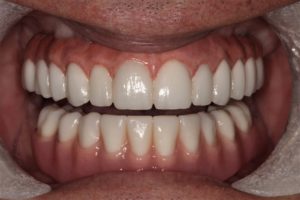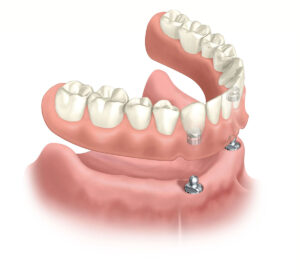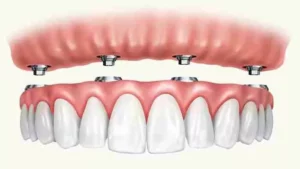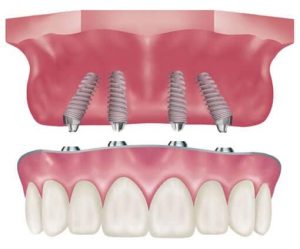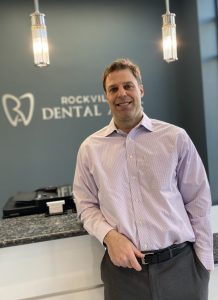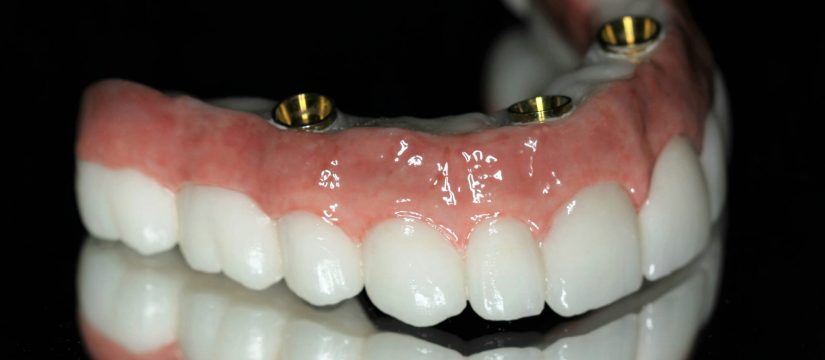
Choosing between snap on dentures vs all on 4 implants impacts not just your budget but your everyday quality of life. This analysis dispenses with the fluff to concisely break down the differences, from investment to implant experience, so that you can assess which solution aligns with your needs and lifestyle.
Key Takeaways
- Snap on dentures are a more affordable but less permanent tooth replacement option using 2-4 implants, while All-on-4 dental implants use four per arch, offering greater stability and permanence at a higher cost.
- All-on-4 implants provide a more natural appearance, stronger bite force, and higher comfort during eating and speaking, as they don’t cover the palate and allow for a full taste experience.
- While snap on dentures have lower initial costs, All-on-4 implants are generally more cost-effective in the long run due to durability and lower maintenance needs; however, both require attention to oral hygiene and proper care for longevity.
Decoding Dental Solutions: Snap On Dentures and All on 4 Implants
Two solutions are often highlighted in the quest to replace missing teeth: Snap On Dentures and All-on-4 Dental Implants. Both options utilize dental implant technology but differ in the number of implants required and their permanence. Snap on dentures typically require 4-8 dental implants, whereas All on 4 implants use 8-12 implants to anchor a full set of teeth.
Snap on dentures tend to be less expensive upfront, costing roughly $25,000 for a full set, compared to around $55,000 for the entire All on 4 treatment. However, the cost isn’t the only consideration. Both necessitate oral surgery for implant placement, so considering the long-term implications of your decision is key.
Understanding Snap On Dentures
As versatile tooth replacement solutions, snap on dentures, also known as implant supported dentures:
- Utilize 2-4 implants for support
- Can be either removable or fixed
- Are designed with locators to attach to the abutments of the implants
- Provide increased retention, support, and stability
This makes snap on dentures a suitable option for many patients with tooth loss, as they can easily switch to snap in dentures or even traditional dentures if needed.
Despite their advantages, snap on dentures do come with some considerations. For instance, their clips may loosen over time, and they may appear less natural than fixed options or single implants for each tooth. When comparing snap on dentures vs removable dentures, it’s important to note that snap on dentures are designed to be removed for cleaning and should be taken out before bedtime if they are removable dentures.
Insights into All on 4 Dental Implants
In contrast, All-on-4 dental implants are designed as permanent fixtures in the mouth, unlike snap-on dentures which require nightly removal. The All-on-4 concept involves using only four dental implants per arch to provide a full replacement of all missing teeth, consolidating the need for multiple implants into a more efficient treatment.
All-on-4 dental implants are renowned for their exceptional stability. This ensures that the overdenture stays securely in place, facilitating a stronger bite force compared to conventional dentures.
The Aesthetics and Functionality Faceoff
Beyond practicality and cost, aesthetics and functionality are key considerations when choosing a tooth replacement solution. Thankfully, both snap on dentures and all on 4 implants offer a more natural appearance than conventional dentures. However, All-on-4 implants are considered superior in offering a more natural tooth appearance due to strategic implant placement and a thinner prosthetic. They also contribute to a stronger bite force, enhancing functionality.
The All-on-4 dental solution, often viewed as a hybrid option, merges the affordability of conventional dentures with the functional benefits of dental implants. But what about comfort and the eating experience? Let’s delve into that next.
Appearance and Comfort
The decision between snap on dentures and All-on-4 dental implants can be largely influenced by comfort and natural appearance. All-on-4 dental implants are designed to offer a more natural appearance compared to snap-on dentures because they are fixed and strategically placed. Their stability contributes to a higher level of comfort during everyday activities like speaking and eating.
Conversely, as snap-on dentures cover the roof of the mouth, they can limit the ability to fully savor food. All-on-4 implants, in contrast, do not cover the palate, thus allowing a full taste experience. Overall, the design and placement of All-on-4 implants deliver an all-around more natural and comfortable feel akin to natural teeth.
Bite Force and Eating Experience
When it comes to the eating experience, All-on-4 dental implants reign supreme. They are designed to provide a stronger bite force compared to other tooth replacement options. While snap-on dentures restore full eating and chewing ability, they may not offer as strong a bite force as All-on-4 dental implants.
Patients with All-on-4 dental implants experience an enhanced overall eating experience due to a stronger bite force. Both options do not necessitate special eating and chewing considerations, allowing for a natural diet.
The design of All-on-4 dental implants, which anchors directly to the jawbone and does not rest on the gums, minimizes irritation or sensitivity, providing a comfortable chewing experience.
Investment Considerations: Weighing Costs and Durability
The actual cost of a tooth replacement solution extends beyond the upfront price, encompassing longevity and maintenance needs of the selected option. Although the upfront investment cost for all-on-4 dental implants is significantly higher compared to snap-on dentures, they are generally considered more cost-effective over time due to their longer lifespan and lower maintenance requirements.
Nevertheless, other considerations can sway the overall financial implications. For instance, bone grafting for patients with bone loss may be necessary for dental implants, which can sway the cost in favor of either snap on dentures or implants depending on individual cases. So, let’s delve deeper into these investment considerations.
Initial Outlay vs Long-Term Savings
At first glance, snap-on dentures appear more affordable, with costs for a single arch ranging from $10,000 to $17,000, and a full mouth from $25,000 to $35,000. However, they require ongoing maintenance, including professional cleaning of implants at least once per year and replacement of rubber o-rings every few months, which can add to the total long-term cost.
In contrast, All-on-4 dental implants have an average cost of about $16,000 per arch or $30,000 for full-mouth restoration. While this might seem steep initially, it’s worth noting that these implants are designed to last for many years, often making them more cost-effective in the long run for those who can afford dental implants.
Lifespan and Replacement Frequency
Lifespan and replacement frequency are crucial factors when considering the cost-effectiveness of a tooth replacement option. Dental implants, whether for snap-on dentures or All-on-4 solutions, are designed to last a lifetime with proper care. However, the overdentures for both options have varying lifespans depending on materials and maintenance.
Snap-on denture overdentures typically require replacement every 5 to 10 years depending on care and maintenance, with the implant framework itself potentially lasting a lifetime. Overdentures for All-on-4 implants may need to be replaced after 15 to 20 years or more, with the type of material greatly affecting their lifespan. Zirconia may potentially last a lifetime, whereas acrylic needs replacement every 3-10 years.
Oral Health Impacts: Bone Preservation and Hygiene Practices
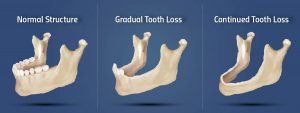
Aside from aesthetics, functionality, and cost, the oral health impacts of the tooth replacement solution you choose are a vital consideration. Both snap-on dentures and All-on-4 dental implants stimulate jawbone health and foster bone growth. However, they each require different conditions for optimal function. Snap-on dentures require uniform jawbone density, whereas All-on-4 implants necessitate adequate bone density primarily in the front region of the jaw.
In addition to bone preservation, good oral hygiene is a must for both options. Regular use of dental floss is necessary, but specific hygiene practices for snap-on dentures and All-on-4 dental implants are not detailed here. For complete care instructions, one should refer to additional resources or sections.
Maintaining Jawbone Integrity
Choosing a tooth replacement solution is largely dependent on maintaining jawbone integrity. Dental implants help prevent bone loss by simulating the root of a tooth, thus providing the necessary stimulation to preserve bone density and health.
By maintaining the natural structure of the face, dental implants can prevent facial sagging and premature aging. This means that implants not only restore your smile but also preserve your natural facial profile.
Daily Care and Maintenance
For both snap-on dentures and All-on-4 implants, their longevity hinges on proper daily care and maintenance.
For snap-on dentures, daily care includes:
- Cleaning with an extra-soft toothbrush and mild liquid soap or non-abrasive denture cleaner
- Removing them nightly and brushing with a denture brush and unscented antibacterial soap
- Rinsing with water
On the other hand, All-on-4 dental implants should be brushed with a soft-bristled toothbrush and non-abrasive toothpaste, carefully cleaning under the denture plate. Regular dental visits every six months are advised for a check-up and professional cleaning.
The Surgical Journey: From Implant Placement to Permanent Teeth
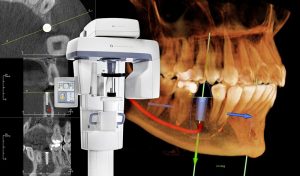
- Surgical implantation
- Healing period
- Installation of temporary teeth
- Fitting of the permanent dentures
The process for both snap on dentures and all on 4 dental implants, also known as implant dentures, begins with oral surgery to place the implants into the jawbone.
While All-on-4 implant surgery can provide patients with a full set of teeth on the same day thanks to the immediate loading capability of the technique, snap-on dentures generally require a healing period before final dentures are fitted. The time until patients receive their permanent set of dentures for snap-on dentures ranges from 4 to 6 months.
Preparing for Surgery
Preparing for dental implant surgery requires adherence to your dentist’s instructions regarding fasting, medication, and appropriate attire. A thorough review of your medical history is also necessary to determine your suitability for the procedure.
Patients are advised to follow the dentist’s instructions about fasting and to avoid eating or drinking anything after midnight the night before. On the day of the surgery, patients should:
- Wear comfortable, loose-fitting clothing
- Brush their teeth without strong flavors in toothpaste or mouthwash
- Bring a list of allergies or medications to the appointment.
Recovery and Healing
Recovery from dental implant surgery requires rest, a soft-food diet, and proper pain management. Both snap-on dentures and All-on-4 dental implants involve a healing period where temporary teeth are worn for 2-6 months before permanent dentures are installed.
All-on-4 implant recovery typically requires at least 72 hours of rest post-surgery, and full osseointegration for final adjustments can take 3-6 months. Patients are advised to prepare for recovery by planning for rest, securing a driver, taking time off work, refraining from exercise, and having over-the-counter pain medications available.
Personalized Tooth Replacement Consultation
A personalized dental implant consultation is key to unravel the complexities of tooth replacement options, including addressing a missing tooth and the impact on your remaining teeth. This consultation helps create a tailored treatment plan, taking into account your oral anatomy and specific dental needs.
During the consultation, you’ll gain a deeper understanding of implant-supported restorations such as snap on dentures and All-on-4 dental implants. Taking this step will empower you to make an informed decision about your tooth replacement options.
Summary
In conclusion, both Snap-on Dentures and All-on-4 Dental Implants offer practical solutions for tooth replacement, each with its unique benefits and considerations. From the initial investment to daily maintenance, aesthetics to functionality, and oral health impacts to the surgical journey, the choice between the two is not a one-size-fits-all decision. It’s about finding the right fit for your individual needs, lifestyle, and budget. Remember, your smile is unique, and so should be your tooth replacement solution.
Frequently Asked Questions
Which are better snap-on dentures or All-on-4?
All-on-4 implants are better than snap-on dentures for eating as they do not cover the roof of your mouth, allowing for easier chewing and the natural taste of meals.
What is the downside to snap-in dentures?
The downside to snap-in dentures is that they are more susceptible to breaking at the implant section due to their finer and more delicate design compared to traditional dentures. This can lead to potential maintenance and repair issues.
Are permanent dentures better than snap-on dentures?
Yes, permanent dentures such as all-on-four implants are better than snap-on dentures for eating as they do not cover the roof of your mouth, allowing for a more natural taste and easier chewing.
How long does snap-on dentures last?
Snap-in dentures can last for at least 5-7 years with proper care and regular dental checkups, while dental implants can last for 25+ years. Regular maintenance and good oral hygiene can help extend the lifespan of snap-on dentures.
What’s the main difference between Snap-on Dentures and All-on-4 Dental Implants?
The main difference between Snap-on Dentures and All-on-4 Dental Implants is the number of implants needed and their permanence. Snap-on dentures require 6-8 implants and can be removed, while All-on-4 implants require 10-12 implants and are permanent.

